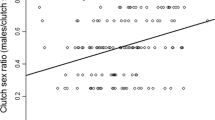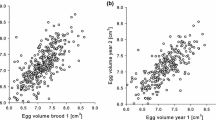Summary
Measures of relative gamete contribution were related to degree of parental investment for both males and females from six groups of communally breeding pukeko (Porphyrio porphyrio). If there is a fitness cost to participation in parental duties, then for males parental investment should relate to degree of confidence of paternity while for females investment should relate to the number of eggs laid. Data were analysed in two ways: (1) by looking at individuals of the same sex within the same group to see if males that had a greater probability of paternity and females that had greater number of eggs in a nest subsequently invested relatively more in parental duties and (2) by pooling the data from the six groups and determining if there was a positive correlation between measures of presumed gamete contribution and amount of parental investment. The results from both types of analyses are variable and give no clear support for a positive relationship between presumed gamete contribution and parental investment even though a possible fitness cost is suggested. Factors which might influence investment are discussed.
Similar content being viewed by others
References
Altman J (1974) Observational study of behaviours: sampling methods. Behaviour 49:227–267
Craig GH, Craig JL (1974) An automatic nest recorder. Ibis 116:557–561
Craig JL (1977) The behaviour of the pukeko Porphyrio porphyrio melanotus. NZ J Zool 4:413–433
Craig JL (1979) Habitat variation in the social organization of a communal gallinule, the pukeko Porphyrio porphyrio melanotus. Behav Ecol Sociobiol 5:331–358
Craig JL (1980a) Pair and group breeding behaviour of a communal gallinule, the pukeko, Porphyrio p. melanotus. Anim Behav 32:23–32
Craig JL (1980b) Breeding success of a communal gallinule. Behav Ecol Sociobiol 6:289–295
Craig JL, McArdle BF, Whettin PD (1980) Sex determination of the pukeko or swamp hen. Notornis 27:287–291
Dawkins R, Carlisle TR (1976) Parental investment, mate desertion and a fallacy. Nature 262:131–133
Emlen ST (1978) The evolution of cooperative breeding in birds. In: Krebs JR, Davis NB (eds) Behavioral ecology: an evolutionary approach. Blackwell, Oxford, pp 245–281
Holmes WG, Sherman PW (1982) The ontogeny of kin recognition in two species of ground squirrels. Am Zool 22:491–517
Howe HG (1979) Evolutionary aspects of parental care in the common grackle, Quiscalus guiscula. L. Evolution 33:41–51
Joste NE, Koenig WD, Mumme RL, Pitelka FA (1982) Intra-group dynamics of a cooperative breeder: an analysis of reproductive roles in the acorn woodpecker. Behav Ecol Sociobiol 11:195–201
Lack DL (1968) Ecological adaptations for breeding in birds. Methuen, London
Mumme RL, Koenig WD, Pitelka FA (1983) Reproductive competition in the communal acorn woodpecker: sisters destroy each other's eggs. Nature 306:583–584
Robertson RS, Biermann GC (1979) Parental strategies determined by expected benefits. Z Tierpsychol 50:124–128
Trivers RL (1972) Parental investment and sexual selection. In: B Cambpell (ed) Sexual selection and the descent of man. Aldine, Chicago, pp 136–179
Vehrencamp SL (1977) Relative fecundity and parental effort in communally nesting anis, Crotophaga sulcirostris. Science 197:403–405
Weatherhead PJ (1982) Risk-taking by red-winged blackbirds and the concorde fallacy. Z Tierpsychol 60:199–208
Werram JH, Gross MR, Shine R (1980) Paternity and the evolution of male parental care. J Theor Biol 82:619–631
Author information
Authors and Affiliations
Rights and permissions
About this article
Cite this article
Craig, J.L., Jamieson, I.G. The relationship between presumed gamete contribution and parental investment in a communally breeding bird. Behav Ecol Sociobiol 17, 207–211 (1985). https://doi.org/10.1007/BF00300138
Received:
Accepted:
Issue Date:
DOI: https://doi.org/10.1007/BF00300138




